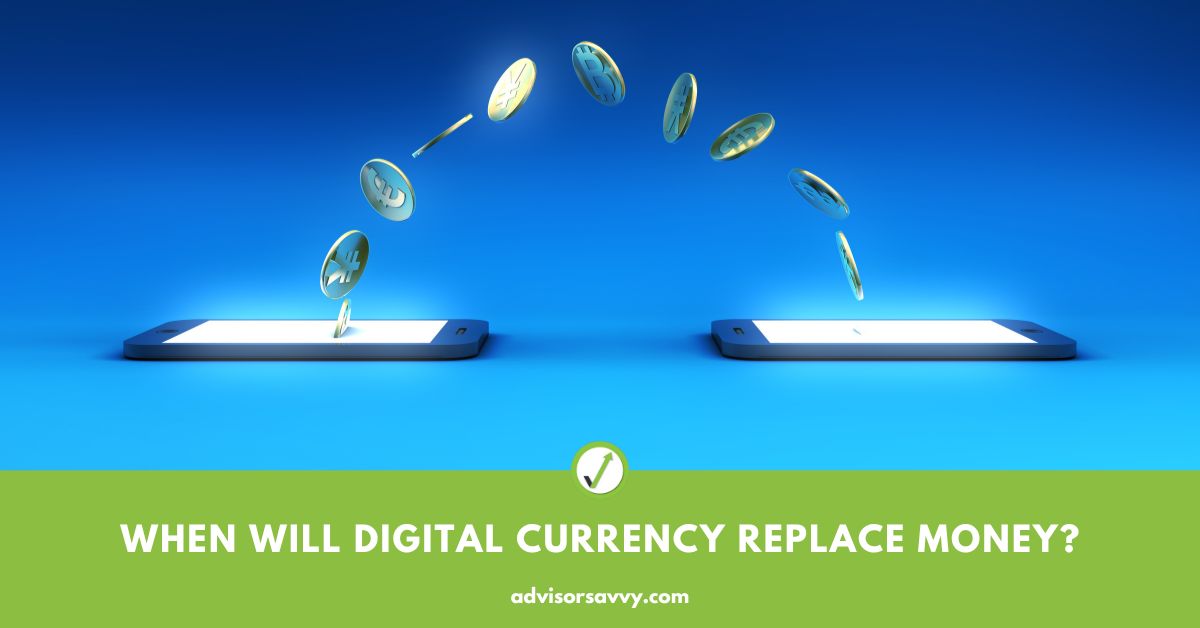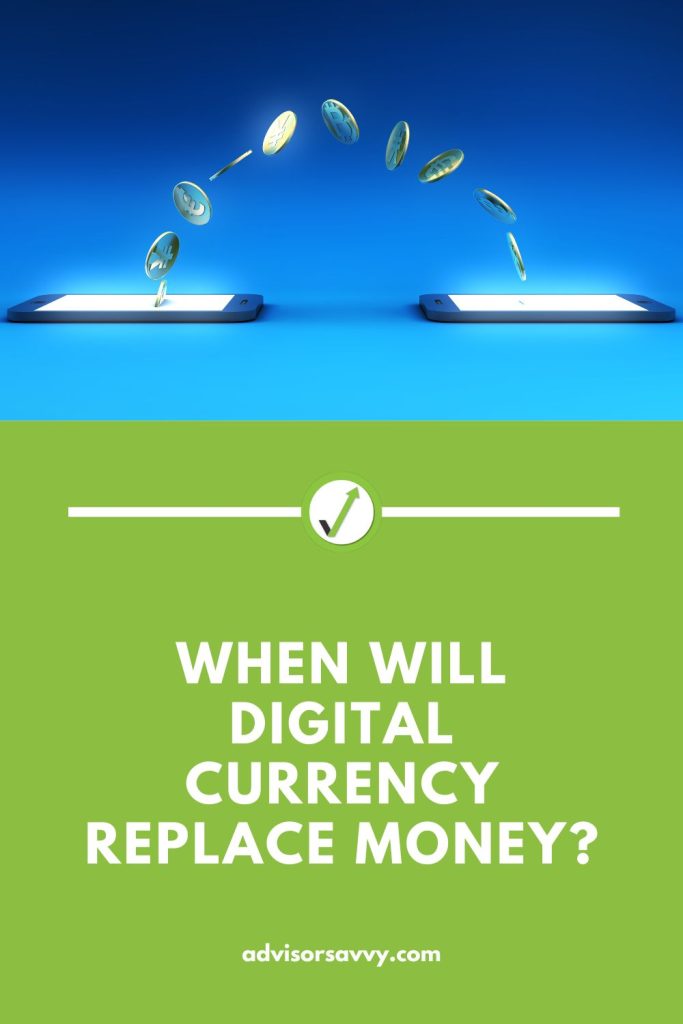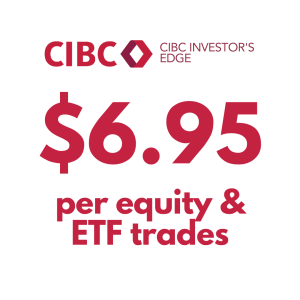
Digital currency might have garnered a few scoffs in the early 2000s, but in 2023? Most people wonder: when will digital currency replace money? Financial experts debate whether digital currencies, like Bitcoin, Ethereum or other decentralized currencies, could actually replace today’s physical money. Even our trusted roster of financial advisors has more and more clients seeking financial advice surrounding digital currency from investment and personal finance perspectives. In this guide, we’ll walk through the ins and outs of digital currency, its pros and cons, and what to expect in Canada and beyond regarding digital currency as a new norm. Continue reading to learn more!

Table of contents
- What is digital currency?
- What is a central bank digital currency?
- What are the advantages of digital currency?
- What are the disadvantages of digital currency?
- Is the world going to digital currency?
- Is Canada going digital currency?
- When will digital currency replace money?
- How do I prepare for digital currency?
- Digital currency replacing money and your finances
What is digital currency?
Digital currency, sometimes called virtual currency, is money that’s stored, exchanged, and managed primarily online, whether that’s through online wallets or decentralized exchanges. In other words? It’s pretty much electronic money. You can’t see or touch it like you can with cash — but you can still buy things with it.
CIBC Investor’s Line Offer
Up to $6.95 per online stock or ETF trade. Plus, there’s no minimum account balance.
Hang on, isn’t that the same concept as a credit card, or money in your online bank account? Not quite. We’re talking about digital currency, which is a whole other type of money altogether. These aren’t dollars, Euros, or Great British Pounds we’re talking about — digital currency has completely different names outside of the traditional financial system, like:
Furthermore, traditional currency is backed by assets owned by a country, such as gold, silver and other valuable assets. In the early 1970s, the concept of fiat money was introduced. This is money which value is based on the creditworthiness of the issuing government body. In other words, the value of fiat money is dependent on supply and demand. In many ways, fiat money is produced by financially leveraging the country that issues it. Today, most major currencies across the world are fiat money.
Digital currency is a completely new type of money that is considered a disruptive financial technology to come out of the 21st century. It’s value is backed by central banks and their creditworthiness or authority, as opposed to government.
Related Reading: Is Bitcoin Legal in Canada?
What is a central bank digital currency?
A central bank digital currency is a virtual currency that is issued and backed by a country’s central bank, as opposed to the government.
For example, the Bank of Canada doesn’t yet have a digital currency. However, they’re in the works of negotiating and discussing the possibility of a digital currency version of the Canadian dollar. Right now, they’re surveying citizens for feedback, researching methods of implementation, and assessing risk before making any decisions.
At the time of writing, only 11 countries in the world have a fully launched central bank digital currency:
- Antigua and Barbuda
- Saint Kitts and Nevis
- Montserrat
- Dominica
- Saint Lucia
- Saint Vincent and the Grenadines
- Grenada
- Jamaica
- The Bahamas
- Anguilla
- Nigeria
CIBC Investor’s Line Offer
Up to $6.95 per online stock or ETF trade. Plus, there’s no minimum account balance.
However, 21 more countries including China, Saudi Arabia, Australia, and Turkey are in the pilot phase of their digital currencies. Similarly, much of the world is in discussion and research stages exploring the possibility of a digital currency, just like Canada.
Related Reading: Types of ETFs in Canada
What are the advantages of digital currency?
At first glance, one might say the main advantage of digital currency was of a criminal nature. Digital currency has been notoriously used as an anonymous form of payment for illegal goods on the Dark Web. Further, it has been used to facilitate fraud or create modern Ponzi schemes. But today? Digital currency brings a host of advantages that even law-abiding citizens can reap, including:
- Diversification: Anyone of our financial advisors will tell you diversification is the investment strategy of the most wealthy. You might have an RRSP, mutual fund, and maybe even a few stocks in your favorite Fortune 500s. Next time you have a little extra money to invest, you could diversify with digital currency. The technology still has a long way to go, so it’s a high risk investment, but it will likely pay off in the long run!
- Inflation stability: The Canadian and US dollars always fluctuate in value with inflation, but other countries like Argentina get the brunt of this fluctuation when the value of their currency declines. That’s why digital currency appeals to many as a form of inflation protection. For example, Bitcoin cannot increase its supply, as the founder only created a set amount. This makes it difficult for the currency to lose value, as opposed to some fiat currencies that governments overprint in supply. Plus, decentralization eliminates the monopoly of currency where governments can decide its worth—only the market does.
- Speed: Ever waited 3 to 5 business days for an international money transfer to go through? Digital currency doesn’t come with that issue. Cryptocurrency and other digital currency transfer internationally within minutes.
- Fewer fees: Digital currency doesn’t require a bank or third party to facilitate a transaction. Meaning? Transactional fees are minimal—even for international transfers.
Of course, no investment (or currency) is perfect. In addition, digital currency is still in it’s infancy, so there are a lot of kinks to be ironed out. Keep reading for some of the downsides to digital currency.
Related Reading: Digital Marketing Strategy for Financial Planners
What are the disadvantages of digital currency?
Turns out, most Americans aren’t convinced cryptocurrency is completely safe. In addition, a recent poll conducted by the Bank of Canada found that 80% of Canadian respondents are strongly opposed to the research and development of issuing a digital currency in Canada. Here are some of the disadvantages people are considering:
- Potential for scams: People made a lot of money with the rising value of cryptocurrency — including scammers, who took home an estimated $14 billion in 2021. New trading platforms pop up all the time, some of which don’t have the most secure infrastructure. News flash, they aren’t legit at all, but rather schemes for fraud.
- Not regulated: Yet. While many countries are exploring digital currency to be issued and backed by central banks, it’s currently not regulated enough to offer much protection in the event of fraud or theft.
- Environmental effects: The power needed to mine cryptocurrencies is astronomical, and would put a serious burden on the environment once widely accepted by more countries.
- Not always accepted: True, some restaurants and retailers might have a Bitcoin ATM and accept digital currency — and more sure will in the coming years. But for now, you won’t have as easy a time buying lunch with Bitcoin than you would with cash or other commonly accepted forms of payment.
CIBC Investor’s Line Offer
Up to $6.95 per online stock or ETF trade. Plus, there’s no minimum account balance.
But is the latter only in the interim? Will businesses start accepting digital currency sooner than we think?
Related Reading: 10 Best Free Stock Research Sites
Is the world going to digital currency?
Pretty much. A quick look at the previous section in this article shows that over 30 countries have either completely launched a centralized digital currency or are in very close steps to doing so. Similarly, big countries like Canada, Mexico, the US, and Brazil are only a few of the nearly 70 countries that are in the research and development stages of launching a digital currency backed by their central bank.
Despite this fact, not everyone is on board with the research and development of digital currency, as mentioned above. Due to the criminal and fraudulent nature of digital currencies seen in recent years, many consumers are wary of using it. In addition, digital currency can be confusing to the average person who is not deeply knowledgeable in computer science and finance. The monetary system we have today is a lot easier to comprehend.
But how about independent businesses? Will they start buying supplies and accepting payments in digital currency? You’ll see more of that in big cities like Toronto and Vancouver, but it’s seriously unlikely that businesses will stop accepting fiat currency in preference of digital ones. Ultimately, if digital currency does become the main currency of the world, it will take many, many years for it to become the dominant form of payment.
Related Reading: 5 Best Bitcoin ETFs in Canada
Is Canada going digital currency?
Canada already has plenty of businesses accepting digital currency and financial institutions storing them for Canadians online. However, in terms of a central digital currency, Canada is still only in research and development stages. One day, Canada may issue and back their own digital currency, but we still have a long way to go.
When will digital currency replace money?
Within the next decade, you can expect more countries to release a national digital currency to perhaps not replace but at least supplement their local currency.
Still, experts aren’t always on the same page in their stance on whether digital currency will actually replace money. The International Monetary Fund (IMF) sees digital currency as capable of replacing cash, though it would likely take years. The organization sees digital currency as a natural progression in an increasingly digital economy and world, citing benefits like cost-effective cross-border payments, accurate and international credit scoring, and financial security.
But if you ask government entities like the US Federal Reserve? Despite exploring digital currency further in the coming years, they assure citizens that they’re committed to ensuring the availability of fiat currency and cash. They do not seek to replace money with digital currency in the immediate future.
Related Reading: Ethereum ETFs in Canada
How do I prepare for digital currency?
Step one is to educate and protect yourself. There’s no shortage of crypto scams as we mentioned earlier, so awareness and education about digital currency, trusted exchanges and resources, and best practices will help you feel more familiar with it and thus prepared to use it in the future.
Check out resources like the Government of Canada or tech organizations for more details.
Digital currency replacing money and your finances
Bottom line: when will digital currency replace money? Our take — not anytime soon in Canada. Still, it’s not going anywhere, and every savvy investor should read up on it to understand how it works intimately before it becomes more commonplace. And if you need a helping hand? That’s what our certified financial advisors are here for. They’ll sit down and discuss your unique financial scenario with you to help you navigate your next best financial move. Ready to get a handle on your finances and diversify with digital currency? Talk to a financial advisor today!
Read More: How to Become a Digital Nomad

